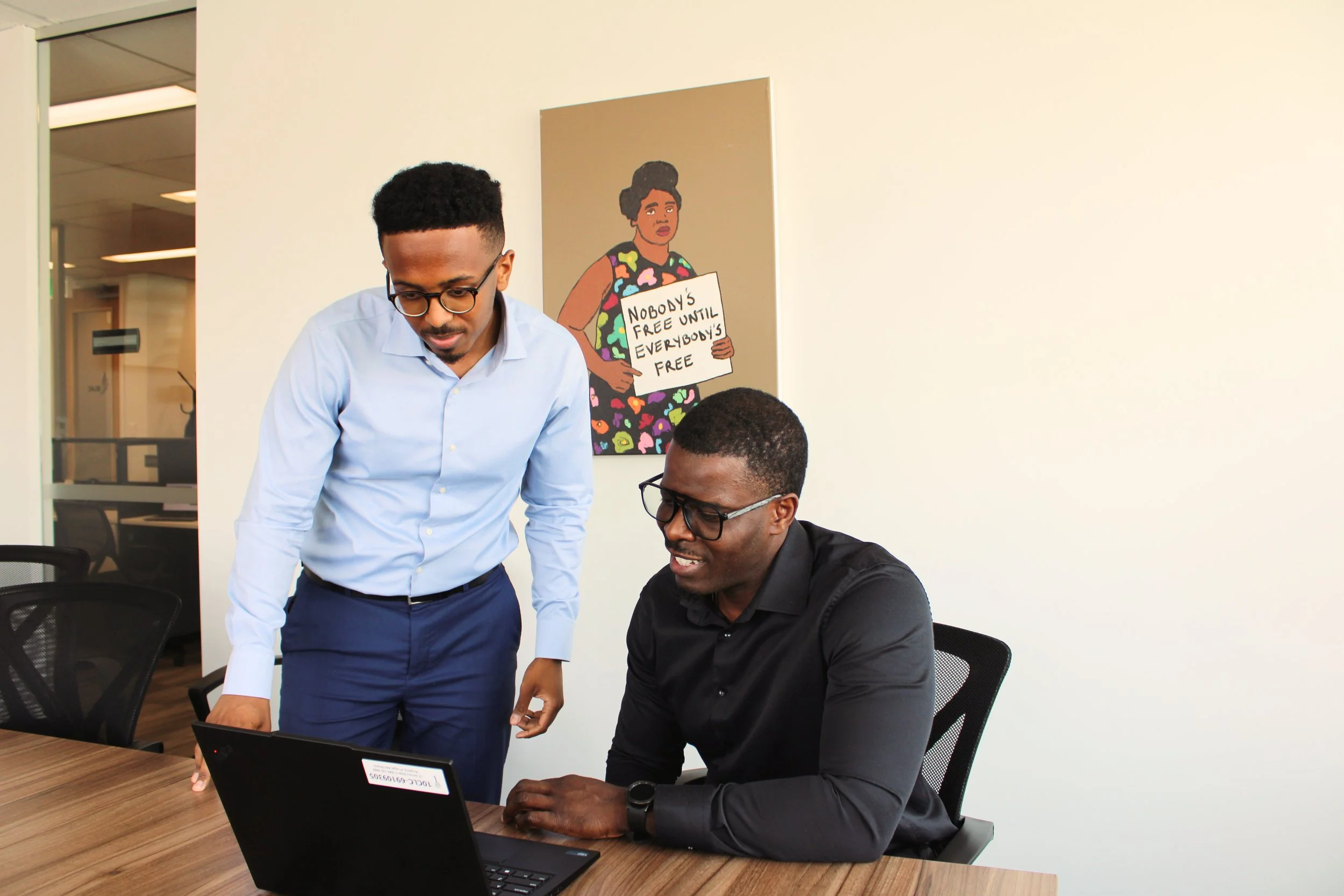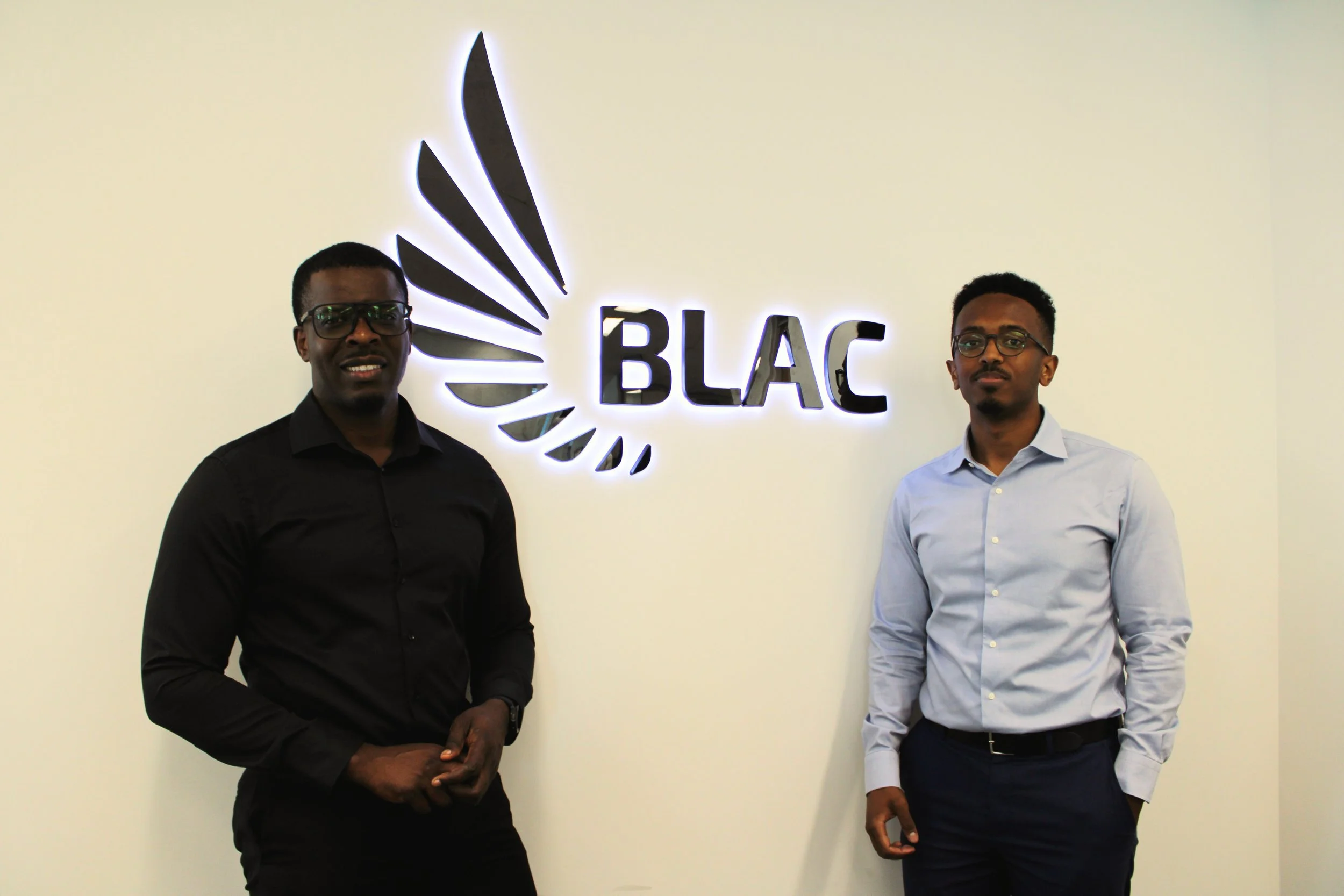Demar Hewitt and Adonai Yohannes’ Mentorship Journey: Level’s Blazing Trails Mentorship Program
Level’s Blazing Trails Mentorship Program (BTMP) is a unique mentorship program designed to help law students engage with daring lawyers who have blazed trails and defined their own metrics of success. Open to all law students across Canada, the program pairs students with mentors working in social justice-oriented careers. This profile highlights the mentorship journey of Demar Kemar Hewitt and Adonai Yohannes, participants in BTMP.
On June 11, we sat down with two participants from the Blazing Trails Mentorship Program (BTMP) to reflect on their journey together. Meet Adonai, an incoming 2L student at the University of Ottawa, and Demar, the Executive Director of Black Legal Action Centre (BLAC). The two were matched through BTMP and are now working alongside each other, with Adonai completing his summer placement as a law student at BLAC. We spoke with them about their mentorship experience and what it’s been like transitioning into a professional working relationship. Read their story below.
Adonai Yohannes, mentee, and Demar Kemar Hewitt, mentor, pictured at Black Legal Action Centre (BLAC), where they currently work together.
DEMAR
What made you become a lawyer?
I became a lawyer by accident. It’s always a funny story… But I became a lawyer when a friend of mine said “I didn’t have a profession”, and another friend was visiting a law school for a new program they were starting. I call him, “I heard you are going to check out this law program”. He says, “Yeah I’m going during my lunch”, I say, “Okay that’s fine. I’ll follow you” And that was it. I ended up at law school and next thing you know, I’m back at work and it clicked in “What the hell did I just do?”. I enrolled in law school and had absolutely no clue. (...) And then I started to freak out “What did I just do?! What did I just do?!”. But, you know, I followed through with it, and it’s been a very, very good experience. You know, it’s one of those decisions that I made, it was not thought out at all, but I certainly have no regrets.
What makes you passionate about your work? Feel free to talk about the social justice aspect of things.
So, I started law and one of my first major cases was against the Ottawa Police Service. And it was one of those “Driving while Black” cases that I just got when I became a lawyer, in Canada, and with no clue of what the system looks like behind the scenes. (...) And that experience just enlightened me to the Black-experience, being an immigrant coming from Jamaica to Canada. It’s not something we’re so in tuned with in Jamaica, because it’s a majority Black country. (...) This is something I’m passionate about: A young lawyer just doing law but at the same time, trying to understand what racism is, and how racism manifests itself here in Canada.
I recognized that I can only make a difference if I'm at the table to make a decision, right? And the passion for the work grew, the more I got involved and the more I realized that you could do one or few things to make a difference. Because I could easily be on the other side myself as a Black man, that’s what drove me to continue doing the work. But the more you realize that in the end that you can make a difference, that sense of victory, even if it's a smaller one, is what I look forward to at the end of each cause.
What drew you to becoming a mentor in the Blazing Trails Mentorship Program?
So, when I just became a lawyer, the Law Society has what you call the Coaching Advisor Program. And I was assigned a coaching advisor. At the end of it, I felt like I still needed more guidance. (...) And so I reached out and they said, you only get one shot at it, but I pleaded that I really would need another year with an advisor or otherwise, I might mess up. And they decided to make an exception and assign me to another lawyer, and she was excellent. She gave me a lot of guidance on things to look out for, professionally, how to grow myself in the profession. The hurdles that I'll face as a Black lawyer, as an immigrant lawyer, all those things. In addition to the legal and practical advice, she was very honest in giving me all sorts of guidance on how I put myself in places where I could improve my prospects of overcoming those barriers. And that's something that I certainly thought I could pass on. Having had the benefit of that, I thought that then I would want to return the favor if the opportunity presents itself. So when you reached out for this program, certainly I was more than willing.
Adonai and Demar.
How would you describe your partnership with Adonai over the program?
I admire the growth that I have seen in him, which is really good. I was probably the proudest when I found out that he got elected to the executive of the Black Law Student Association (at the University of Ottawa). That was a very good step forward. I know we (to Adonai) had that conversation early on, that you want to start to build your network, to be in positions of authority, to make those connections. So, seeing him take on that position made me proud.
You found this opportunity for him as well, is that right?
Yes, certainly. I thought since we do have this program here, it's our first year of it, it would be good to bring him on board to make sure that he, in addition to the mentorship, see what it's like in community work and in a legal clinic.
What was the best part of the program for you?
I think the selection process was effortless and was good. Adonai, as a person, also made it easier for me as well. Seeing that he is someone who has ambition and who is pushing forward is something you feel proud to watch.
Adonai and Demar.
ADONAI
Why were you interested in social justice in particular?
Advocating for the voiceless and underrepresented communities. Me, being a Black person, and also being an immigrant, I know what it’s like, coming to a new country and being a racialized person and the struggles that people face and access to justice, as well as access to other types of services. So, me being an advocate, I found that to be meaningful work. Hence why I was interested in social justice.
What drew you to the Blazing Trails Mentorship Program?
I remember in my first year of law school, I was really interested in getting some type of mentorship. I came across the Level Justice program, and noticed its social justice focus, so I realized it was a perfect match. I would say it was like the best pairing. In terms of, I really had a lot of things that I could relate to. Being an immigrant, being an international, he practiced law in a different country, and coming into Canada and having to adjust and learn. So, I could relate in a way to his experiences of being a Black lawyer working in human rights. So, I feel like a lot of the advice that I get from him I could relate to, and I could really learn from.
What was the best part of the program for you?
In terms of the program, I would say I really liked the flexibility of it. From past experience, many mentorship programs can be quite demanding and difficult to balance with other commitments. But with Demar, I feel like it was very natural, our relationship went beyond strictly professional. Unlike other mentorships I’ve had, which stayed professional, my connection with Demar grew into a personal relationship. We even met more than the required times.
Would you recommend this program to others?
Definitely, yes. I would say, especially for first year law students, you go into law school, not knowing what the realities of the legal profession would be. So, I feel like having a mentorship opportunity like this type, specific to law students, would really help incoming law students into building that network and learning those skills meaningful for our legal journey.
Adonai and Demar’s story is a reminder of the power of mentorship, not just to guide, but to inspire and empower future leaders in law.
BTMP will begin accepting mentee applications in September 2025. To stay informed, please sign up for our newsletter or follow us on social media (@leveljustice).




